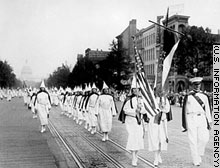January 23, 2004
By Kevin Drew
 |
CNN(CNN) --Is wearing a masked hood at a public rally the same as shouting
"Fire!" inside a crowded theater -- or is it closer in significance
to burning an American flag?
Legal rulings on what is protected under the First Amendment free-speech law
have used the classic "yelling fire in a crowded theater" metaphor
to describe an act that could endanger society -- and thus can be regulated.
Burning a flag, on the other hand, has generally been considered a protest that
should be protected.
A 2nd U.S. Circuit Court of Appeals panel ruled on Tuesday that a New York
state anti-mask law did not violate the free-speech rights of supremacist groups
such as the Ku Klux Klan. Legal experts are divided on this ruling and whether
it clarifies contradictory court decisions on wearing masks at public demonstrations.
"In the end, we all know what the (New York) statute is after -- the wearing
of hoods, such as by the KKK. That may or may not be a bad thing," said
Robert Destro, a professor of law and free-speech expert at Catholic University
in Washington, D.C. "These laws need to clearly state the government's
interest." The hoods include a mask.
The 3-0 ruling by the appeals court panel reversed a district judge's decision
that found the state law violated the First Amendment rights of the Butler,
Indiana-based Church of the American Knights of the Ku Klux Klan.
But, Destro said of the reversal: "You can read that opinion until you
go blind and not know what the KKK did wrong."
Also, he said, anti-mask laws theoretically could be extended to affect people
at various public gatherings, such as annual Mardi Gras celebrations.
Panel equated mask with robe and hood
Originally enacted in 1845 in response to disputes between landowners and tenants,
New York's law prohibits masked gatherings in public places.
The American Knights had argued that the wearing of the mask was symbolic speech
that is protected by the Constitution.
The group describes itself in court papers as an organization that advocates
white separatism and "white pride," according to a Reuters report.
"Particularly given current times, we are grateful that the court recognized
the serious law enforcement implications of public gatherings with masked individuals,"
said Ronald Sternberg, an attorney with New York City's Law Department, in a
news release.
The three-judge federal panel said the mask was not protected because it does
not convey a message independently of the KKK's robe and hood.
Previous lower-court rulings have found that the robe and hood together constitute
an act of intimidation and therefore are not protected by free-speech law.
"Since the robe and hood alone clearly serve to identify the American
Knights with the Klan, we conclude that the mask does not communicate any message
that the robe and hood do not," the appeals court said. "The expressive
force of the mask is, therefore, redundant."
Intimidation or free speech?
The appeals court decision is in line with previous rulings that found publicly
wearing masks at rallies could endanger public safety, according to Edward Larson,
law professor at the University of Georgia.
"Wearing a hood isn't just considered speech, but an action, and actions
can be limited," Larson said. "You can't run into a crowded theater
and yell 'Fire!' and simply call it free speech.
Such reasoning is also behind court rulings that criminalize cross burning,
Larson said, but have allowed flag burning. Actions that can endanger public
safety or lead to a violent response can be regulated, but flag burning is not
considered an act that incites violence, he said.
But the appeals court panel's reasoning sidestepped that argument, Destro said.
"Their ruling danced around the intimidation aspect," he said. "It
would have been a lot cleaner if they said the government has an interest, a
public safety interest, for example, in regulating wearing hoods at public rallies."
Anti-mask laws do have certain "constitutional problems" that affect
free-speech rights, according to Martin Redish, a Northwestern University law
professor. Such laws are "a direct interference on symbolic expression,"
which courts have upheld, Redish said.
Larson countered that the impact of wearing masked hoods at public rallies
is more than speech.
"It's one thing to allow the KKK to march -- courts have consistently
ruled for that," he said. "But wearing masks, burning crosses, those
are acts associated with intimidation. The predictable action is more like a
physical act, one that leads to violence."
Prior rulings are mixed
Supporting Larson's argument, the Georgia Supreme Court in 1990 upheld misdemeanor
charges against a Ku Klux Klansman who was arrested in a suburban Atlanta county
for wearing a mask.
"A nameless, faceless figure strikes terror in the human heart,"
stated the court opinion in that case.
A federal court in Indiana, however, came to a different conclusion in 1998
when the Klan challenged a Goshen city ordinance barring the use of masked hoods.
The U.S. District Court judge in that case ruled that the law had the effect
of "directly chilling speech" by interfering with the Klan's right
to associate anonymously.
The Supreme Court has upheld the First Amendment right of citizens to communicate
and congregate anonymously in several cases, but those cases have not involved
the Ku Klux Klan.
In a 1995 case about barring the anonymous distribution of political leaflets,
the high court wrote that, "Anonymity is a shield from the tyranny of the
majority."
Find this article at:
http://www.cnn.com/2004/LAW/01/23/antimask.ruling/index.html